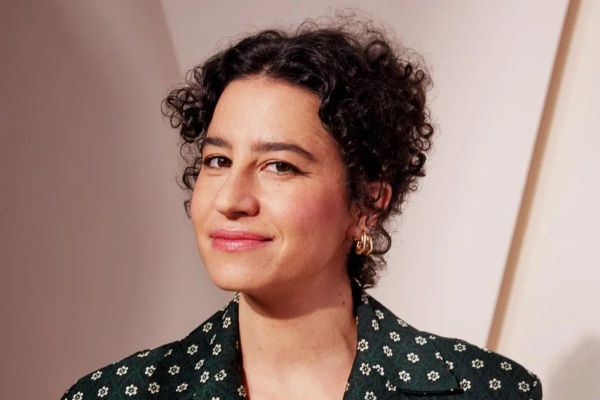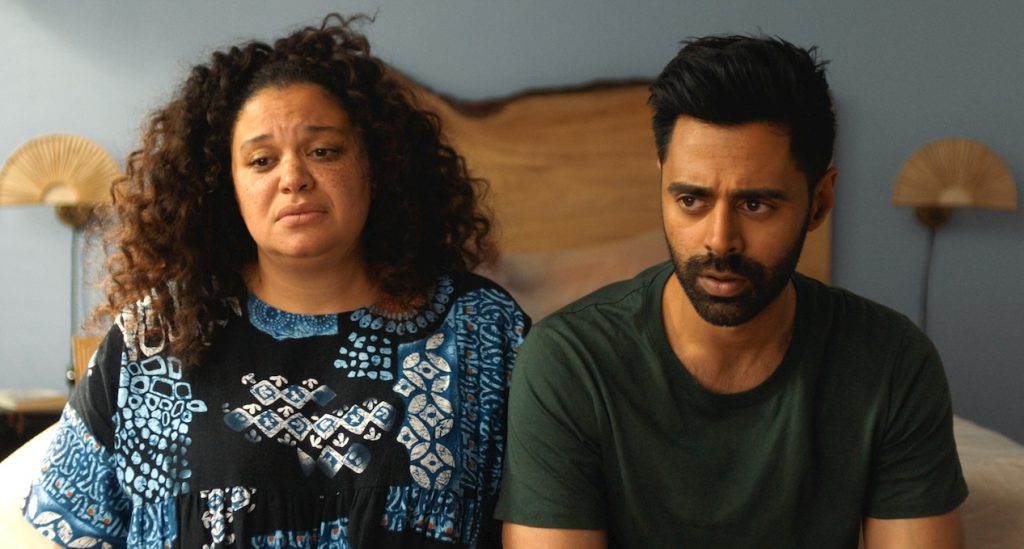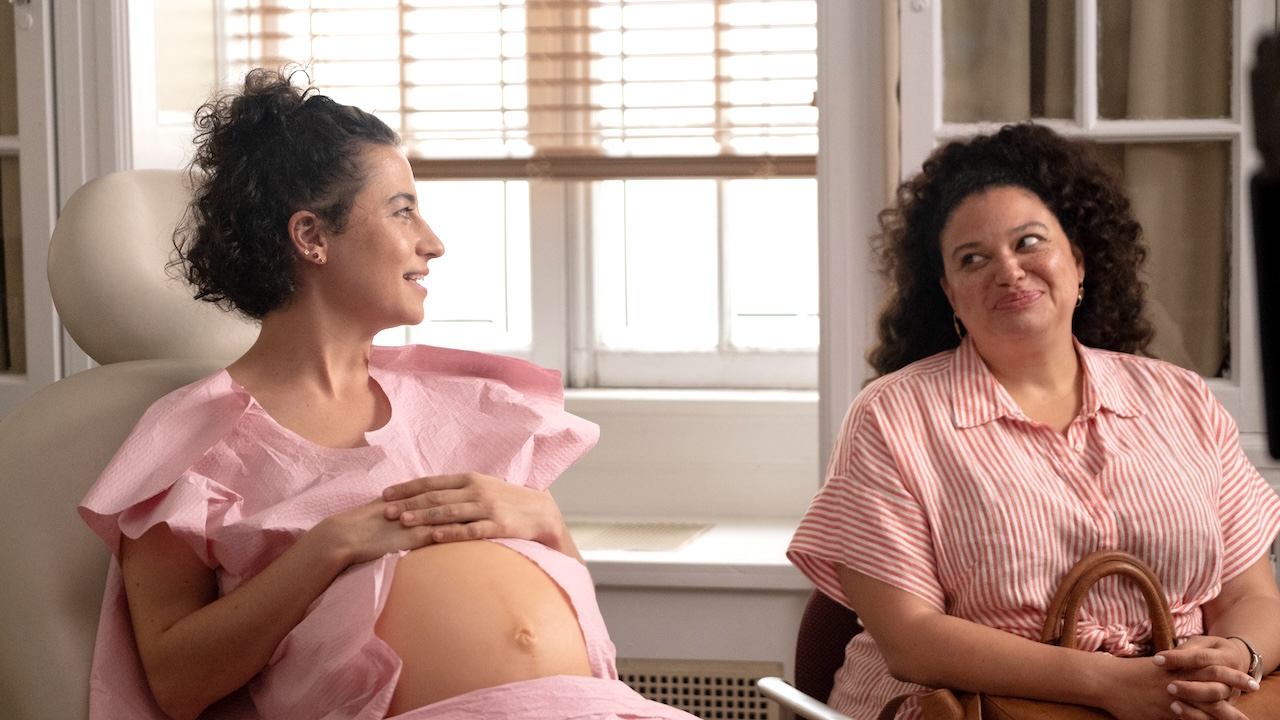Don’t be fooled by the frequent cussing and sometimes far too graphic bodily function jokes in Babes because, at its core, it tells the story of two inseparable friends Eden (Ilana Glazer) and Dawn (Michelle Buteau) testing their friendship through their journey through pregnancy and motherhood.
The genesis of Babes began when producer Susie Fox had this vision of a female buddy comedy about two women in the throes of motherhood while she was showering. She was raising a one and three year old while juggling a thriving career at the time. Coincidentally, Ilana Glazer was pregnant as was co-writer Josh Rabinowitz’s wife. Ilana and Josh (Rel) have been working together since their standup days so are comfortable with each other’s comedic sensibilities, so a writing collaboration was a natural extension in Babes.
They started writing Babes in January 2021 as Untitled Pregnancy Project. “We started brainstorming and putting our ideas in a Google doc. And we’re cracking up. I’m finding my visceral experience of pregnancy so funny, so bizarre. I started getting really sick and I wasn’t even upset about it. I was like, ‘This is hilarious. This is never ending,'” recalls Ilana.

Ilana Glazer
At the time, both Josh and Ilana were learning about breastfeeding. “He’s trying to be a good partner, I’m trying to do my research, and Susie’s like, ‘It’s so rough, man,‘” says Glazer.
Changing Friendships
“The thing that became the trunk of the tree that could hold all of the branches of hard comedy was the way your friendships change, especially in adulthood.” The writers also tapped into their networks in search of hilarious pregnancy-related anecdotes. Director Pamela Adlon (Better Things), compared and contrasted out the “moms in training” story as the “experienced mom of three” who’s seen it all.
Ilana Glaza co-created Broad City with Abbi Jacobson, an observational comedy about two friends making mountains out of molehills in New York City, so the Eden/Dawn dynamic felt familiar to her. “I think the story of friendships changing in your twenties is still getting fleshed out in our cultural discourse. It’s still worth telling in new ways.” Glazer also notes that the story of friendship dynamics in your thirties hasn’t been well-represented on our screens.
“The way your friendships change as certain people become parents and others don’t was the trunk of the tree for us. We knew we had the hard comedy, but the heart was more important to us.”
“That heart was the thing pushing up against the comedy, creating the tension for the tone of this movie. And as for the coming of age and a friendship movie, I also think that friendships and their function in life is changing today. Culture is changing. Things are shifting and the nature of and need for deep, strong friendships in our thirties is becoming stronger.”
The changing nature of friendships as you move from teenagers to adulthood is at the core of Babes. “You need your friends to know yourself, to orient yourself in your own life, to help you,” muses Glazer. The nature of friendships is also examined when Eden and Dawn are very different people. At one point they even question if they would even be friends had they not grown up together.
Eden is a free-spirited yoga instructor who recklessly falls pregnant during a one night stand and Dawn is a career woman with a husband, a toddler and a baby on the way.
Are Eden and Dawn just bosom buddies or have they become a found family of sorts? Has Eden crossed the line when she asks if she can move in with Dawn and her family after their babysitter quit? These stressors to friendships and pushing boundaries is further explored in Babes.
Ilana Glaza poses the questions, but chooses not to immediately answer them. “I think that’s one of those artful nuggets that’s left to the viewer and reflects who the viewer is,” she ponders.
“I was more worried it came across as entitlement.” She recalls the big fight scene between Eden and Dawn where Dawn insists they take some time apart. “Eden’s character is deeply in need, but I think now that I am a mom and working, I very much identify with Dawn.”
Writing The R-rated comedy
Filmmakers rely on gross-out jokes and “going there” moments to state their case to the audience. Glazer whole-heartedly embraces these tropes so long as they are emotionally grounded. But they don’t always need to be. You can insert a small number of R-rated jokes in an R-rated comedy for the humor of it.
“I find certain things really funny that have no emotional grounding, but even in a slapstick video on the internet, often there is a level of emotional groundedness and vulnerability. The two to go hand in hand for me.”
I find comedy to be funniest when it is rooted in something that’s relatable emotionally

Dawn (Michelle Buteau) & Marty (Hasan Minhaj). Photo courtesy of Neon
Glazer and Rabinowitz pay similar attention to the male characters although they occupy less screen time. These include Dawn’s husband Marty (Hasan Minhaj), OBGYN Dr. Morris (John Carroll Lynch) and Eden’s distant and honest father Bernie (Oliver Platt). “I think male characters need to be as multifaceted and complex as female characters. I find it unhealthy to prescribe an flatness in characters and say, ‘This is what a self-actualized man looks like.”
“I think characters and storytelling are continuing to develop and become more and more colorful. It wasn’t like some intentional thing. I think more emotionally complex characters have the opportunity to be funnier.”
Babes ends on an upbeat and hopeful note as the two besties realign and redefine their friendship. Eden gives birth and Dawn is nearby, but not by her side. They’re in a calm place, but there’s also some latent volatility.
“I think at the end of this film, these two friends have had their friendship tested and they’ve both lost their minds a little bit, which really is not uncommon in the first couple years of having a child,” states Glazer.
“I think they find that if they trust themselves, trust each other, and trust what they know, they can feel secure in their lives and move forward. I think ultimately they’re in a much stronger place.”
